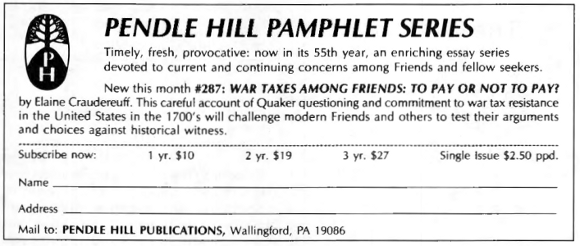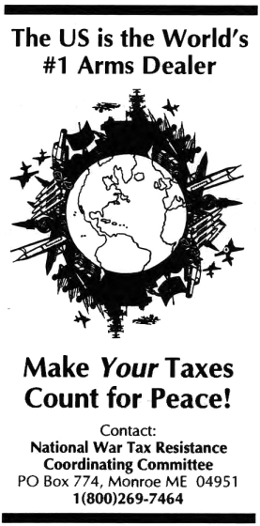War tax resistance in the Friends Journal in
There were several references to tax resistance in the Friends Journal in , but many of them referred to some other time or country or religious denomination, and those that referred to American Quakers in the here-and-now lacked much urgency or enthusiasm.
Journal editor Vinton Deming marked the passing of Colin Bell in his opening editorial in the issue, and noted:
One spring at yearly meeting he spoke very movingly in support of young Friends faced with the draft. He challenged some of us over draft age to consider that not only our young people were being drafted; our federal taxes were being conscripted for the war as well!
I visited him once at Davis House in Washington with a friend whose house was threatened with IRS seizure for unpaid war taxes. Colin was keenly interested, shared a generous amount of time from his busy schedule, and was very supportive. As we left he walked us to our car. I still hear the cheerful sound of his words (and see the twinkle in his eye) as he leaned in the car window, shook our hands, and said, “Good bye, Friends. Take care of your spirit!”
In a letter-to-the-editor in the issue, Carole Hope Depp split hairs over whether or not war tax resistance is civil disobedience — claiming that since the Constitution, the highest law in the land, protects freedom of religion, then a law that purports to force people to violate their religious scruples by paying for war must be void, and so those who resist it are not being disobedient at all.

an ad from the issue of Friends Journal
In the issue, Paul Zorn took issue with “some traditional Quaker attiudes and institutions,” including war tax resistance, as representing “an attitude that somehow Quakers are different from the bulk of society, and that much of our institutional effort should go to maintaining that difference… [and] that maintaining certain aspects of our uniqueness is more important than finding a larger consensus in society.” Excerpt:
…Philadelphia Yearly Meeting is resisting an IRS levy on salaries of two employees to recover unpaid federal taxes because those funds would be used for military purposes. The more I have talked with individuals and attended large and small groups, both in my monthly meeting and in the yearly meeting’s Representative Meeting, the more troubled I am with the policy, although I realize it has been fashioned with much care and concern for the Spirit over 15 years or more.
As I understand it, a tax refusal contest with the federal government usually ends with the government getting the money. The main result of refusing taxes is to make a public witness, and to ease a conscience that is troubled by voluntarily supporting the military. I am troubled that part of the public witness consists of breaking the law and attempting to justify it, especially when tax refusal is as likely to reduce funds for low-cost housing, etc., as it is to reduce funds for the military. Regarding voluntary support of the military, I think it is part of the irony, tragedy, or reality of modern life that despite our best efforts, institutions to which we belong act on our behalf in ways that we consider wrong, evil, or disastrous. At the present time, we cannot effectively separate ourselves from all such institutions, and we would lose some of our humanity if we did.
He suggested that Friends consider “rethinking how much corporate energy we should put into tax refusal as an aspect of our peace testimony” and instead “trying to deal directly with some of the major problems of society rather than trying to insulate ourselves from them.”
The issue also described the war tax resistance of Sharon Bienert, who wrote letters to the IRS, agitated for a legal peace tax fund, and meanwhile split her resisted taxes between a Quaker-run peace tax fund and an escrow account. That issue also mentioned that war tax resistance was “strongly supported” by the Lafayette, Indiana, Mennonite Fellowship. Fellowship member Ken Nagele redirected a military-percentage of his income taxes to a low-income loan program; Mary Ann Zoeller redirected hers to Amnesty International; other families have donated income to the church to keep their income low and resist taxes that way.
That issue also brought news of a peace tax fund legalization campaign in Australia which “would allow conscientious objectors to pay 10 percent of their income taxes into a fund to be used for nonmilitary purposes” but which had only gained the support of eight of the 76 Australian Senators thus far.
In the issue, Carolyn Stevens reviewed two books published by the Friends World Committee for Consultation’s Friends Committee on War Tax Concerns: Handbook on Military Taxes & Conscience and Fear God & Honor the Emperor which were collaborative efforts edited by Linda Coffin, Peter Goldberger, Robert Hull, and J.E. McNeil.
The first of these books concerned “the history of military tax refusal among Friends and biblical teachings on the subject[,]… personal stories of military tax resisters, one about international war tax refusal campaigns, and another that chronicles efforts to enact Peace Tax Fund legislation. The book concludes with a series of study questions and a resource list.”
The second “tackles the difficult question of how religious employers may be called to corporate witness of military tax refusal, either organizationally or in support of staff members who are conscientious objectors. There is a survey of minutes, resolutions, and guidelines adopted by church bodies, Quaker and otherwise. A chapter on legalities, co-authored by Peter Goldberger and J.E. McNeil, calmly raises and responds to difficulties, real and imagined, that employers face when supporting a witness against military taxes. Robert Hull’s chapter on discernment blends a secular management perspective with traditional religious concerns.”
Stevens was enthusiastic about the first book (a “high level of sincerity and scholarship [that] gives us wonderful assistance”), less so about the second, which she described as “awkward,” “clumsy,” and “defensive” though “rich in necessary information.”
The issue brought an update on Canadian war tax resister Jerilynn Prior’s test case in which she was trying to get conscientious objection to military taxation legalized under the freedom of conscience portion of the (relatively) new Canadian Constitution. She wasn’t having any luck in the courts. The article claimed that “[m]ore than 500 Canadians withhold the portion of their federal taxes that would otherwise go toward military expenditures. Many instead allocate the money to Conscience Canada’s Peace Tax Fund.”
Beit Sahour
The story of the nonviolent tax resistance campaign against the Israeli military occupation of Palestine in Beit Sahour got some coverage in the Journal. Editor Vinton Deming wrote an article for the issue that was hopefully subtitled: “Nonviolent strategies may help to bring an end to the Israeli occupation.” It was based on his conversations with Mubarak Awad and Nancy Nye.
Awad founded the Palestinian Center for the Study of Nonviolence in and published a blueprint for nonviolent resistance to the Israeli occupation. “At first, people thought we were a bit crazy, that perhaps I had come back from my time in the U.S. with some strange notions. We started with just five people. We would sometimes go to a public place and carry a sign that said ‘Down With the Occupation,’ or, ‘Don’t Pay Taxes.’ People at first would laugh and make fun of us.”
The Center later advocated a set of tactics, including “a boycott among the Arab population of all Israeli-made products; refusal to pay taxes or to work for Israelis; insistence that all mail be addressed to people by using the Palestinian language, not Hebrew; and the initiation of many self-help projects.”
Beit Sahour was an example of where Palestinians decided to try out some of these ideas in service of the intifada. “People there,” said Mubarak, “to show their support for the uprising, decided they would refuse to pay taxes to Israeli authorities — no taxes at all. The Israelis wanted to punish them so they came and confiscated the ID cards of a number of the business men.”
So what was the community’s response? “Well,” Mubarak continues, “without your ID card you are stuck, you cannot go any place. When people in the village heard about this, they said, ‘If they are going to take the ID cards of these businessmen, we are going to turn in our ID cards too.’ And they did. So the Israelis called a curfew in the village and they said, ‘Here, please take your ID cards;’ they gave them all back!”
And the news of this incident spread to other communities? “Yes,” Mubarak says, “everybody began thinking it was a good idea to do it. You say, ‘OK, I’m not going to hurt the Israelis, but this is what I’m going to do.’ And people will get together and say, ‘Let’s do it.’ Palestinians are what I would call ‘trial and error’ in their approach. Like, if this works, well, we’ll try it and continue to do it; if it doesn’t, it’s all right, we’ll do something else!”

